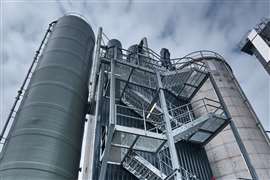Deadly serious
24 April 2008
The Collapse of a Tower crane next to the main Construction Court in London, UK last month, serves as a clear reminder that health and safety should be top of the construction industry's agenda. Fortunately no one was killed or seriously injured as a result of the collapse but the outcome of construction accidents is not always so positive.
In cases where a death occurs, UK companies can be prosecuted under ‘corporate killing' laws where a company, as opposed to an individual, can be charged with criminal offences. Work is underway to reform these laws and in July this year the Corporate Manslaughter and Corporate Homicide Bill was laid before the UK parliament and could become law in 2007.
The difficulty for the construction industry will be determining who will be considered to be a senior manager.
Necessary Reform?
Under the current laws, the police, with the assistance of the Health and Safety Executive, will undertake an investigation following a work- related death. This investigation will first look at whether the death resulted from an individual's gross negligence, or in Scotland that person's recklessness. But second, the investigation will also look at whether the individual was sufficiently senior in the organisation that their guilt should equate to the company also being considered guilty of manslaughter.
In UK law there is a precedent for the Crown Prosecution Service to prosecute work related fatalities as manslaughter cases, with health and safety charges as a back up.
This was shown by the prosecution of Barrow-in-Furness Council senior architect Gillian Beckingham and Barrow-in-Furness Council, who were both originally charged with manslaughter and health and safety offences relating to the death of seven people from legionnaires' disease in 2002. The outbreak resulted following Miss Beckingham's cancellation of a contract that would have included necessary tests on an air conditioning unit at a building owned and operated by the council.
At the first trial in April 2005, the judge dismissed the manslaughter charges against the council although it was found guilty of contravening the Health and Safety at Work Act 1974. The prosecution subjected Miss Beckingham to a retrial earlier this year for manslaughter. She was acquitted of all seven charges of manslaughter but found guilty of a health and safety offence.
The case laid against Barrow- in-Furness Council and Miss Beckingham demonstrates the difficulties which the prosecution currently faces with securing manslaughter convictions due to the ‘identification principle'. This requires that a senior level individual - in most cases a director or someone of equivalent standing - be personally guilty of manslaughter. As a result of this principle, only seven companies have ever been convicted under the current law and all of them were small companies where a guilty directing mind could be identified.
New Test
Under the proposed new law, an organisation will be guilty of corporate manslaughter if gross miss-management or organisational failing cause's a person's death. The new offence will apply to management failings by an organisation's senior manager - either individually or collectively. The new law will move the focus from the culpable individual to the combined senior managerial responsibility.
The difficulty for the construction industry will be determining who will be considered to be a senior manager. For example, will a project or site manager at a construction site be considered to be involved in managing of a substantial part of an organisation's activities? The differentiation is likely to depend on the value of the project in comparison to the turnover of the company as a whole.
Ultimately it will be for the jury to decide whether any breaches of health and safety law and guidance are sufficiently serious to warrant a conviction of manslaughter. Unfortunately, with hindsight failures can often appear worse than they actually were but what is clear that the line between a health and safety offence and a corporate manslaughter offence will not be an easy one to draw.
Going Forward
The Corporate Manslaughter and Corporate Homicide Bill will inevitably lead to greater consideration of corporate manslaughter charges following work related deaths in the UK. Certainly, most work-related deaths will be investigated as potential corporate manslaughter cases and prosecutors will be eager to establish the parameters of the new offence. As such, care will need to be exercised and legal advice from the outset will become essential when dealing with the authorities following a work related fatality.




